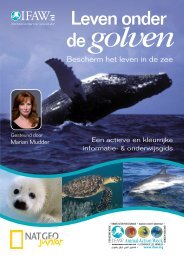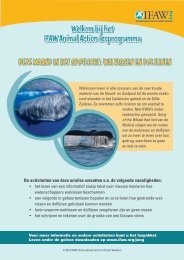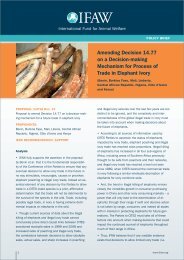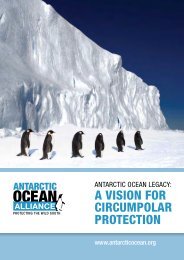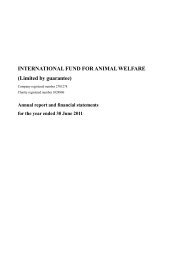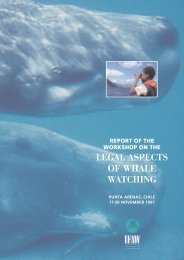Whale Watching Worldwide
Whale Watching Worldwide
Whale Watching Worldwide
Create successful ePaper yourself
Turn your PDF publications into a flip-book with our unique Google optimized e-Paper software.
Local Case Study: Japan<br />
Internationally, Japan is better known for whaling than whale watching. Many people in non‐whaling<br />
countries are surprised to learn that Japan has the largest cetacean watching industry in Asia (by total<br />
expenditure), particularly given the controversy over its ”scientific whaling” programme. In fact, Japan’s<br />
whale watching industry generates many times more revenue than its whale meat industry, which is also<br />
heavily subsidised by the government.<br />
Japanese attitudes to whales, whaling and whale watching are often misunderstood by foreigners. Japan<br />
has conservationists who are just as committed to conserving cetaceans as their counterparts overseas.<br />
Other Japanese are determined to protect what they see as their cultural, economic and culinary heritage, in<br />
continuing to hunt and eat whales. The vast majority of the population sits in the middle – broadly<br />
supportive of conservation, consider themselves ‘nature’ lovers and not opposed to the idea of eating whale<br />
meat. Many Japanese see no contradiction in going whale watching one day and another day eating whale.<br />
<strong>Whale</strong> watching operations in Japan sometimes reflect this breadth of opinion. Many operators emphasise<br />
conservation and strive to inform their patrons about cetaceans’ lives and the threats they face. They<br />
provide information about whales and other ecological issues. This is particularly the case in Eastern<br />
Hokkaido, Okinawa and Ogasawara, areas known for their clean environment and ecotourism.<br />
In other areas, such as Shikoku, parts of Honshu and parts of Hokkaido, fishermen make some extra money<br />
by taking tourists to see whales, but there is little emphasis on conservation and little effort to develop into<br />
a sustainable tourism industry. Parts of these communities are said to be unfriendly towards whale<br />
watching, due to perceptions that it may harm efforts to reinstate whaling in the future. This is a shame for<br />
whale watching locally, as these areas have great potential, with some of the best large cetacean sightings in<br />
the country.<br />
Like public opinion, the vast majority of cetacean watching in Japan is between these two extremes. By far<br />
the largest number of cetacean watchers in Japan watch dolphins in the western bays of Kyushu. Operators<br />
here do not seem to emphasise conservation issues or education, but they are keen to promote dolphin<br />
watching and dolphins as a lucrative symbol of the area’s tourism. Dolphin watchers are often day‐trippers<br />
and families, who have fun watching the playful dolphins, without considering the issues that trouble the<br />
pro‐ and anti‐whaling factions. Dolphin watching here is fun and lucrative.<br />
This last point about cetacean watching being lucrative is important. I recently met a Japanese butcher and<br />
discussed Japanese meat markets. He lamented that whale tongue, his favourite cut, is so difficult to come<br />
by. He had recently been whale watching in Victoria, Australia but could not understand why Australians<br />
would object to his selling whale, when they are quite happy to eat kangaroo. While he has no intention of<br />
stopping eating and selling whale, he was interested to hear about the economic value of whale watching in<br />
Australia, Japan and other places. As a small businessman, he quickly understood the implications of even<br />
limited whaling on the profits of businesses set up to watch the rare and spectacular mammals.<br />
Convincing Japanese that whaling is morally wrong will be very difficult. Convincing them that their whale<br />
watching industry needs support and protection might be a lot easier.<br />
Rod Campbell – Rod lived in Japan for two years and completed his undergraduate environmental economics<br />
studies at Kyoto University. This is his personal reflection on whaling and whale watching in Japan.<br />
142









